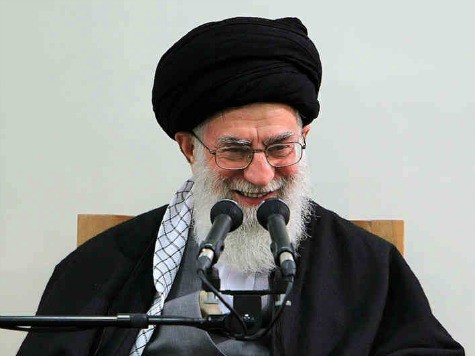Iran’s Supreme Leader Ayatollah Khamenei has banned unrelated men and women from talking to each other over the internet or on social media. This latest fatwa came about as an answer in his regular online Q&As with the public.
As Al-Arabiya reports, Khamenei responded to a question about intergender chatting on the internet–whether it defies Islamic law. “Given the immorality that often applies to this, it is not permitted,” the Ayatollah responded. The email response constitutes a legal edict in Iran and does carry the legal weight of a fatwa despite being published online and in conversation.
The Supreme Leader often answers questions from the public on his website, Khamenei.ir, though the English-language side of the site currently has no new announcements. The Ayatollah gave no further explanation of decreeing such a limitation on the use of the internet, but to many who have been following the years of attempted suppression of internet use, the only surprise is that it took them this long to ban yet another method of using the internet to communicate.
In interviews with Iranians in Tehran, Fox News found that many consider the move to have more to do with the government’s distrust of social media used for political advantage than any moral objections. The Iranian government long ago blocked Facebook, Twitter, and YouTube (though the Ayatollah Khamenei has an official Facebook page), and this week also announced the outlawing of the website WeChat, a smartphone application similar to WhatsApp. The Iranians with whom Fox News spoke were concerned that their government was attempting to strengthen “a society in which we are watched by Big Brother,” and that the Ayatollah is working to prevent people from “connecting” to reduce the possibility of a new uprising similar to those in 2009 when Mahmoud Ahmadinejad won reelection in a vote that many considered fraudulent.
The fatwa is a reminder of who genuinely wields power in the Islamic Republic, particularly after a year in which the so-called transition of power from Ahmadinejad to Hassan Rouhani had many hoping Iran would become a more open society. It is a “so-called” transition because the president in an Islamic Republic always responds to the chief Islamic authority–the Ayatollah Khamenei–and that shows no signs of changing anytime soon. Rouhani has, however, attempted to change the tone of his office by doing things like denouncing the Holocaust as both real and “reprehensible,” something that sounds moderate when compared to the unhinged tenure of Ahmadinejad. Aside from accepting that the Holocaust was real, Rouhani has also attempted to win over the West by speaking to President Obama on the phone and wishing Pope Francis a Merry Christmas over Twitter (again, a medium civilian Iranians are forbidden from using).
This latest fatwa from Khamenei makes clear that Rouhani is merely the smiling theater mask of a stern, forever frowning dictatorship guided exclusively by Khamenei’s hand.

COMMENTS
Please let us know if you're having issues with commenting.